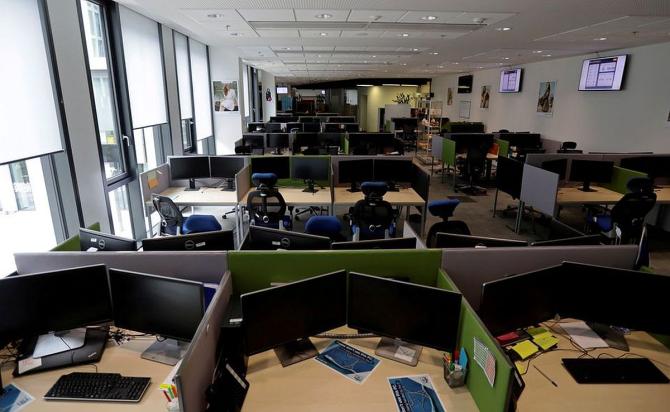The net leasing of Grade-A commercial office space in India will stagnate this financial year at 32-34 million square feet, with global uncertainties brewing caution among key tenant categories, according to the latest Crisil Ratings report.

Major seven cities in India – Bengaluru, Chennai, Hyderabad, Kolkata, Mumbai Metropolitan Region (MMR), National Capital Region (NCR) and Pune – had Grade-A office space with an operational stock of around 705 million square feet as of March 2023.
India’s commercial office space is dominated by technology companies, with information technology (IT) and IT-enabled services (ITeS) companies occupying 42-45 per cent of the operational stock.
“That said, the inherent strengths of the Indian market and increasing shift to return to office should help demand pick up over the medium term, keeping credit profiles of office asset owners stable,” the report stated.
Global capability centres (GCCs) of multinational corporations have also emerged as a key category of tenants in the past few years, occupying around a third of the total stock.
These two determinants will keep demand modest in the near term amid global economic headwinds.
“Net leasing of office space will be impacted by two factors this financial year.
"One, headcount addition in the Indian IT/ITeS sector has already come to a halt amid tapering revenue growth and pressure on profitability.
"Plus, the sector may look to control costs, including rent. Two, GCCs may defer large-scale leasing plans in India amid weak macroeconomic outlook in key regions such as the US and Europe,” said Gautam Shahi, director, Crisil Ratings.
According to commercial real estate consultant Vestian, the Bengaluru office market remained slow during Q3 (July-September) this year as leasing activity and demand-supply dipped.
However, Hyderabad saw an increase in all segments, pushing it to the top of the list.
Bengaluru, the hub for IT companies, has shown a significant decline in leasing transactions.
In Bengaluru, the absorption of office space fell 28 per cent year-on-year to 3.6 million square feet during Q3.
The new supply for commercial spaces also declined 25 per cent year-on-year to 2.7 million sq. ft.
In Hyderabad, the leasing of office space jumped 270 per cent to 3.7 million square feet. New supply soared 175 per cent to 5.5 million square feet.
Crisil states that demand from the domestic enterprises in the banking, financial services and insurance (BFSI), consulting, engineering, pharmaceuticals, and e-commerce segments, which occupy the remainder of India’s office area, will remain buoyant, resulting in net leasing of 32-34 million square feet this fiscal, same as that in fiscal 2023.
Employers’ push for increased physical occupancy in offices may prove to be another tailwind for office leasing.
Most companies, including those in technology, are now pushing for a return to office on most days of the week.
Physical occupancy, which averaged 40 per cent last financial year, is expected at 65-70 per cent this financial year, Crisil said.
“Notwithstanding the near-term hiccups, net leasing is expected to grow 10-12 per cent next financial year to 36-38 million square feet.
"Growth is expected to remain at a similar level over the medium term as well supported by both GCCs and domestic enterprises,” said Saina Kathawala, associate director, Crisil Ratings.
“GCCs are expected to drive office demand, given the cost advantages of the Indian market as well as the other developing markets and availability of a skilled talent pool.
"Additionally, demand from domestic enterprises will remain healthy backed by strong financial health and good growth prospects,” Kathwala added.
Given the sound medium-term outlook and adequate leverage, credit profiles of office operators will remain stable.
A Crisil Ratings analysis of office space owners with over Rs 70,000 crore debt and total leasable area of about 185 million sq. ft. corroborates it.
According to Crisil, the ratio of debt to earnings before interest, tax, depreciation and amortisation (Ebitda) and debt service coverage ratio will remain “comfortable” under 5.0 times and at 1.6-1.7 times, respectively, this financial year and the next.
“That said, the duration and intensity of the global economic slowdown and its impact on hiring as well as overall business plans of companies can impact future leasing and will bear watching,” it said.











